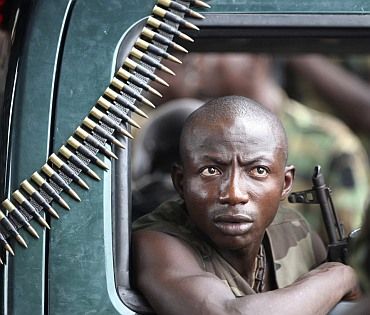 The United Nations Human Rights Council on Wednesday unanimously adopted a resolution appealing to international community to provide more active support to African countries fighting Nigerian Islamist militant group Boko Haram.
The United Nations Human Rights Council on Wednesday unanimously adopted a resolution appealing to international community to provide more active support to African countries fighting Nigerian Islamist militant group Boko Haram.
The resolution titled 'Atrocities committed by the terrorist group Boko Haram and its effects on human rights in the affected countries' was adopted by consensus in a special session at the UNHRC.
The resolution urged the international community to provide more active and multifaceted support for Cameroon, Chad, Niger, Nigeria and other states affected by the atrocities of the terrorist group.
The resolution also calls upon those who provide support and resources to Boko Haram to put an immediate end to such support and has requested the Office of the High Commissioner for Human Rights to submit a report on the atrocities of the militant group in its 30th session.
Speaking at the special council, UN rights chief Zeid Ra'ad Al Hussein said that the atrocities of Boko Haram, if confirmed, would constitute war crimes and crimes against humanity. He said Boko Haram's insurgency has led to the deaths of at least 15,000 people.
He said children are used as ‘expendable cannon fodder’ by the militant group.
"The group has also repeatedly used young children as human bombs, including a case of a 14-year-old carrying a baby on her back who detonated a bomb in a marketplace. These reports, if confirmed, would constitute war crimes," he added.
"I am also profoundly concerned about the growing ethnic and sectarian dimensions of the conflict. There is no doubt that Christian communities have been targeted, but to date, the majority of its victims appear to have been Muslims," the UN rights chief said.
Boko Haram, loosely translated as ‘western education is forbidden’, is particularly against girls' education and in one instance abducted 276 school girls last year, the fate of whom is yet unknown.
Ajit Kumar, India's Permanent Representative to the United Nations offices in Geneva, in a statement to the council, said that India welcomed the special session and added that, "We must adopt a holistic approach aimed at zero-tolerance towards terrorism. The scourge of terrorism has to be comprehensively fought and eradicated in all its forms and manifestations".
India urged for an early adoption of the Comprehensive Convention on International Terrorism since terrorism does not yet have an agreed upon definition.
Nigeria's Permanent Secretary to the UN offices, Danjuma Nanpon Sheni, said that the situation has been exacerbated by the fact that ‘we are dealing with faceless monsters.
He added that the international community should be very concerned because of the networks Boko Haram has forged with groups such as Islamic State and Al-Shabaab.
Pierre Buyoya, former President of Burundi and High Representative of the African Union for Mali and the Sahel, said in a press conference that Boko Haram has the most sophisticated weapons, missiles and artillery and controls 20,000 sq kms for years which would not have been possible without external support.
The six-year insurgency which started off as a localised crisis in Nigeria's Maiduguri city and adjoining villages, has acquired disturbing regional dimensions around Lake Chad,\ killing at least 15,000 people since 2009, displacing over a million others with 168,000 fleeing to neighbouring countries.





